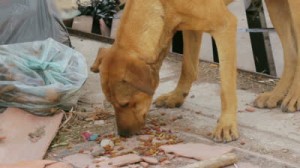Yorùbá ma nṣe rúbọ Èṣù nigba gbogbo ki ẹ̀sìn ìgbàgbọ́ tó gbalẹ̀. Ounjẹ ni wọn ma fi ṣè rúbo ni ọ̀pọ̀lọpọ̀ ìgbà. Irú ounjẹ yi ni Yorùbá npè ni “ẹbọ”. Ìta gbangba ni wọn ma ngbe irú ẹbọ bẹ si, nitori eyi ounjẹ ọ̀fẹ ma npọ fún ajá, ẹiyẹ àti awọn ẹranko miran ni igboro.
Bi ènìyàn kò ti si ninu ìhámọ́ ni ayé òde òní, bẹni ajá pãpa kò ti si ni ìhámọ́. Ọ̀pọ̀lọpọ̀ “ajá igboro” ma jade lọ wa ounjẹ òjọ́ wọn kakiri ni. Alãdúgbò lè pe ajá lati gbe ounjẹ àjẹkù fún pẹ̀lú, eleyi fi idi ti wọn fi nkígbe pe ajá han. Bayi ni ará Àkúrẹ́ (olú ìlú ẹ̀yà Ondo) ti ma npe ajá fún ounjẹ ni ayé àtijọ́:
Kílí gbà, gbo, gbà, gbo
Ajá òréré́, gbà̀, gbo, gbà…
A lè fi òwe Yorùbá ti o ni “Ohun ti ajá mã jẹ, Èṣù á ṣẽ” yi ṣe àlàyé awọn ounjẹ ti Èṣù pèsè ni ayé òde òni wé: ẹjọ, àìsàn/àilera, ọtí/õgun-olóró tàbi ilé tẹ́tẹ́. Ni ida keji, ajá jẹ “Agbẹjọ́rò, Babaláwo/Oníṣègùn, ilé-ọtí àti ilé iṣẹ́/ero tẹ́tẹ́”.
Bi a bá ṣe akiyesi, Yorùbá ni “Ọ̀gá tà, ọ̀gá ò tà, owó alágbàṣe á pé”. Bi Agbẹjọ́rò ba bori tàbi kò bori ni ilé-ẹjọ́, owó rẹ á pé, aláìs̀an ni ilera bi ko ni ilera, Babaláwo/Oníṣègùn á gbowó. Bi ọ̀mùtí yó tàbi kò yó, Ọlọti/Olõgun-olóró á gbowó àti bi ẹni tó ta tẹ́tẹ́ bá jẹ bi kò jẹ owó oni-tẹ́tẹ́ á pé.
ENGLISH TRANSLATION
Yoruba often offer sacrifice before the advent of Christianity. Food are often used for the sacrifice. This type of food is called “Sacrifice”. Such sacrifice are usually placed in the open, as a result, there are plenty of free meals for the dogs, birds and other animals on the Streets.
As people’s movement are not restricted like in the modern time, so also are the dogs not in restriction. Many “Street dogs” roam around to source their meal. Neighbours can beckon on the stray dog to offer left over meals, hence the reason for the various style of beckoning on dogs. Check out the above recording the way people in Akure (capital of Ondo State) beckons on the Street dogs in the olden days.
We can use the Yoruba proverb that said “What the dog will eat, the Devil will provide” to compare the kind of food provided by the Devil in the modern days as: Cases, sickness, alcoholism/hard drug or gambling shop. On the other hand, the dog can be parallel with: Lawyers, Doctors/Herbalists, Pub and Gambling House/machine.
If we observe another Yoruba proverb that “Whether the boss sells or not, the labourer will collect his/her wage”. This means, whether the Lawyer/Barrister wins a case in court or not, his/her legal fees must be paid, same as whether the sick person is well or not, the Doctor/Herbalist has to be paid. Whether the Drunkard/Drug addict is intoxicated or not, the Pub-owner’s will be paid.
Originally posted 2013-10-15 20:25:03. Republished by Blog Post Promoter




